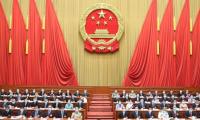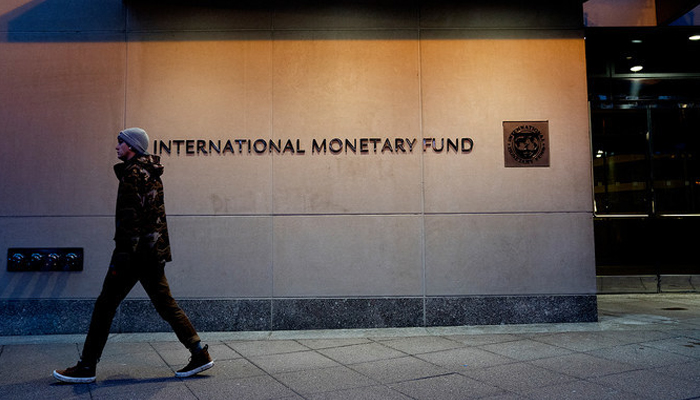Why getting IMF involved in polls is a bad idea
Question is why IMF is being asked to look into Pakistani elections — and what lender of last resort can even do about this
THE recently held elections leave much to be desired in terms of providing political stability that can transition towards macroeconomic stability. This is being made worse by an attempt to send letters to the IMF to withhold extension of any new facility to Pakistan. For context, PTI party leader Ali Zafar said on Thursday that PTI founder Imran Khan will write a letter to the IMF, demanding it stop its support for Pakistan due to “rigged elections”.
The question is why the IMF is being asked to look into Pakistani elections -- and what the lender of last resort can even do about this. This was also pointed out by South Asia Institute Director at The Wilson Center Michael Kugelman who tweeted on Thursday that the proposed letter by Imran to the IMF would “be disregarded and have no value, but what a terrible idea. Pakistan badly needs a new loan. Not getting one would be catastrophic for the economy.” Pakistan is stuck in a low-growth trap. Any growth that is in excess of the population growth rate can mostly be due to additional debt, unless the economy is retooled to move away from import-financed consumption, to investment and export-oriented growth.
The fact is that the country requires access to IMF funding to wade through the liquidity crisis, which can facilitate macroeconomic stability. Compounded inflation over the last five years has been in excess of 100 per cent, eroding real incomes and purchasing power across the board. The inability to instill macroeconomic stability may only make things worse, making the population vulnerable to more income and price shocks.
The inability to access the facility will further push the country towards a heightened economic risk scenario, which may further accelerate inflation in the process, and lead to more supply chain distortions. In such a scenario, such assertions that delay the availability of financing facilities can have disastrous consequences for the economy. Such assertions can be deemed anti-people, and will inadvertently hurt the population at large -- while political machinations continue.
The economy is close to the edge. The economic growth attained during the last fifteen years has been through pumping up consumption financed largely through debt. The availability of debt to continue on such a growth trajectory will remain constrained.
Pakistan’s economy needs serious reforms, and that requires all political and non-political participants to develop a consensus on a roadmap that steers the country from a low-growth trap. Political machinations may continue, but making the people, and the economy, victim to such machinations will hurt people more than anything else.
Such volatility may serve the interests of a few hundred power players, but considerably hurts the economic and social outlook for the country’s population. A consensus needs to be developed where we may have to decide whether the country exists to serve the interests of a few hundred power players and rent-seekers, or almost a quarter of a billion people that live in the country.
Engagement with multilateral institutions and other lenders needs to be done in a very cautious and methodical manner, such that the necessary confidence required is not shattered. The populist mantra that can hurt such confidence heightens an already elevated sovereign risk, making it even more difficult to instill macroeconomic stability.
-
 TikTok Says No To End-to-end Encryption, Citing User Safety
TikTok Says No To End-to-end Encryption, Citing User Safety -
 Texas Primary Results: John Cornyn, Ken Paxton Head To Runoff In Heated US Senate Elections
Texas Primary Results: John Cornyn, Ken Paxton Head To Runoff In Heated US Senate Elections -
 Childhood Obesity Crisis: 220 Million Kids May Be Affected By 2040, Report Warns
Childhood Obesity Crisis: 220 Million Kids May Be Affected By 2040, Report Warns -
 King Charles Gets Lumped In With Andrew: ‘He Has A Total Lack Of Awareness And Think Too Highly’
King Charles Gets Lumped In With Andrew: ‘He Has A Total Lack Of Awareness And Think Too Highly’ -
 Demi Lovato Recalls ‘challenging’ Time As Child Star With ‘insecurities’
Demi Lovato Recalls ‘challenging’ Time As Child Star With ‘insecurities’ -
 Microsoft Plans To License AI Agents Like Employees
Microsoft Plans To License AI Agents Like Employees -
 OpenAI Eyes NATO Contract For Coalition Networks Following Pentagon Deal, Source Says
OpenAI Eyes NATO Contract For Coalition Networks Following Pentagon Deal, Source Says -
 Sam Altman Responds To Criticism Over OpenAI’s Pentagon AI Contract
Sam Altman Responds To Criticism Over OpenAI’s Pentagon AI Contract -
 Arnold Schwarzenegger Receives Major Honour After Shocking Snub
Arnold Schwarzenegger Receives Major Honour After Shocking Snub -
 China’s Two Sessions 2026: Key Decisions, Economic Targets And Policy Shifts To Watch
China’s Two Sessions 2026: Key Decisions, Economic Targets And Policy Shifts To Watch -
 Flames’ New Arena In Calgary Earns Praise From NHL Commissioner After Construction Visit
Flames’ New Arena In Calgary Earns Praise From NHL Commissioner After Construction Visit -
 New Email Connects Jeffrey Epstein To Beatrice And Eugenie Because Of Sarah Ferguson: ‘They Should Own This Publicly’
New Email Connects Jeffrey Epstein To Beatrice And Eugenie Because Of Sarah Ferguson: ‘They Should Own This Publicly’ -
 Are You Quitting ChatGPT? Here’s What To Do Before You Switch
Are You Quitting ChatGPT? Here’s What To Do Before You Switch -
 Wild Acquire Michael McCarron From Predators In Trade For 2028 Second Round Pick
Wild Acquire Michael McCarron From Predators In Trade For 2028 Second Round Pick -
 Christopher Reid Gives Update On His ‘heart Failure’
Christopher Reid Gives Update On His ‘heart Failure’ -
 Cole Smith Joins Golden Knights In Deal With Nashville Predators
Cole Smith Joins Golden Knights In Deal With Nashville Predators




